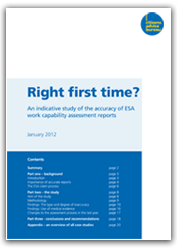Right first time?

An indicative study of the accuracy of ESA work capability assessment reports
Available for download only
Summary
In order to claim benefits, most people who are too ill or disabled to work need to undergo a medical assessment. The report of the assessment is passed to a decision maker, who decides whether, and at what level, people will qualify for benefit.
Employment and support allowance (ESA) was introduced in October 2008, as a replacement for incapacity benefits and a new medical assessment, the work capability assessment (WCA), was introduced alongside it.
There are 6.9 million disabled people of working age in the UK.1 In the year to the end of May 2011, 662,000 people were in receipt of ESA, 1.8 million received incapacity benefits and 3.2 million people disability living allowance (DLA).
Citizens Advice has long had concerns about the nature of medical assessments for incapacity and disability benefits, and the quality of decisions based upon them. We have been monitoring the introduction of the WCA and the whole process for claiming ESA. By May 2011, Citizens Advice Bureaux in England and Wales had given advice on almost 350,000 enquiries about the new benefit, from making an initial claim for benefit to help with appealing decisions. The large number of enquiries reflects the level of anxiety that ESA is causing clients.
CAB advisers tell us that inaccurate medical assessment reports are creating huge difficulties for their clients as well as potentially undermining the Government's welfare reform programme. People with serious illnesses and disabilities, who could not reasonably be expected to seek work, are found fit for work. Others, who, with considerable support, could undertake some work, are denied benefit and, with it, the support it offers to prepare for returning to work. Many of these people are too ill to sign on for jobseekers' allowance (JSA) - they are left with no money tolive on and are unable to seek work.
It is not just CAB evidence that indicates that there are problems with the accuracy of the assessments. In a system that was working well, we might expect appeals to concern marginal cases where points awarded were not quite sufficient to meet the criteria. However, of the appeals heard by February 2011, 39 per cent were overturned in favour of the claimant. Of these, 60 per cent had originally been awarded no points at all.2
It is crucial that WCA reports provide an accurate account of the medical assessment. Not only does the report impact directly on awards for ESA, it is also increasingly used to determine entitlement to DLA, a non-means tested benefit that helps disabled people meet the additional costs of their disability. In the future, the content of the assessment report, and the awarding of ESA, will become ever more significant. It is proposed that the award of ESA will become the main route to disability-related support within universal credit, and the report itself will play a greater role in deciding entitlement to the personal independent payment.
With this in mind, we have undertaken a detailed analysis of the accuracy of WCA reports. We examined, in-depth, reports collected from clients applying for ESA across the country, identified before they attended their initial WCAs. We asked each participant to request a copy of their WCA report from the Department for Work and Pensions (DWP), following their medical assessment. A total of 80 reports were provided by clients - this report describes analysis of 37 of these reports, all of which came from clients verified as having agreed to take part before they had had their assessment.3
Our analysis indicates that the level of accuracy in reports is worryingly low. This is true even where ESA has been awarded. Sixteen of the 37 in-depth reports reveal a serious level of inaccuracy, 10 a medium level of inaccuracy - enough to have a detrimental effect on an award of DLA, and 11 had a low (or no) level of inaccuracy.
This report calls on the DWP to undertake, with some urgency, regular, independent monitoring of the accuracy of WCA reports, to ensure that people who are too ill or disabled to work, either in the short- or long-term, are properly supported by the benefit system.
1. http://www.dlf.org.uk/content/key-facts
2. HC Deb, 28 June 2011, c662W
3. Ony 37 were analysed as we were confident that they were recruited before they had their WCA

